At times there seems to be no happy medium in life. A recent article in Bloomberg claims that the speed at which the FDA is approving newly developed drugs is causing alarm in many consumer advocate groups.
For years the FDA was criticized for lagging behind its European counterpart in its approval process. Now Bloomberg reports that the US FDA is approving drugs at such a fast pace that companies are anticipating approval and preparing their follow-up months ahead of time.
As an example, Global Blood Therapeutics set up its booth in November in time for the annual Hematology conference in advance of its drug’s February approval date. Its timing proved to be correct as its drug Oxbryta was approved to treat sickle cell disease almost three months ahead of schedule.
The FDA’s Commitment
Of course, expediting these drugs has been generally good news for patients with rare diseases. It appears that the FDA has made a firm commitment towards moving these drugs along to ease the patients’ burdens and hopefully save lives.
In 2018 the FDA set a record by approving fifty-nine new therapies. About three-quarters of these approvals were designated priority review, meaning the review would be completed within six months.
Normally, the FDA has ten months to notify a company of its ruling. But in the case of a drug with outstanding benefits, or on the contrary, if few drugs exist for that condition, a priority review is in order. In the latter part of this year, the FDA approved medicines in only eight weeks.
Three companies on the receiving end of the FDA’s commitment were Vertex Pharmaceutical, Novartis AG and BeiGene Ltd.
Vertex has developed a triple combination therapy for cystic fibrosis called Trikafta. The drugs received FDA approval five months ahead of time.
Novartis applied for approval of its drug Adakveo for the treatment of sickle cell disease. The drug was approved sixty-two days earlier than expected.
Brukinsa, developed by BeiGene to treat mantle cell lymphoma, was approved three months before the FDA deadline.
The Change in the Approval Process
Changes in the approval process happened gradually over the past five years and were due in part to advances in genetics and biotechnology. These advances enabled drug companies to give improved data to the federal regulators.
The FDA’s Director Janet Woodcock stated that there has not been a change in FDA policy. Instead, she agrees that the scientific advances have helped to move up the approval time.
In addition, companies are able to communicate more often with the FDA. This resolves issues that are problematic and generally moves the process through on the first application. This, coupled with improved data collection, creates a more efficient and fast-moving environment. Currently, there are over three dozen drugs waiting to be approved.
Concerns About Safety
Advocates for patient safety caution that studies have shown that problems have emerged due to expediting the approval process. They contend that data from clinical trials are sometimes announced as being favorable after seeing the first signs of a response from a few study participants. They add that drugs are coming on the market without sufficient safety information.
This is easy to understand when there are no other treatment options available. However, there are serious consequences when data is derived from a small study group over a short period of time. The patient advocates say that over the past ten years the FDA’s approval criteria have been eased.
One study showed that drugs that receive fast track approval have at least a forty-eight percent likelihood of being ordered to update their package insert warning. Another problem that often occurs is a requirement to update a drug’s contraindications (when it is inadvisable to use the drug). This further restricts their use. Both of these problems occur more frequently in drugs that are expedited than in drugs that are approved along traditional lines.
The reason for expediting is understandable in situations where there are no other treatment options available. However, there are serious consequences when data is derived from a small study group over a short period of time.
About Makena
The injectable drug Makena that was developed by AMAG Pharmaceutical exemplifies one of the objections to expediting drugs. The organization Public Citizen claims that the drug is being marketed to lower the risk of premature birth without substantial proof of its efficacy. This information was only made public after the drug had been on the market for many years.
Where Do We Draw The Line?
Director Woodcock suggests that the system may be working if flaws are discovered once the drug is on the market. She said that it is expected that they will occasionally be wrong. In this respect never being wrong would mean going back to a slower system and patients waiting much longer for a therapy that may prolong life.
A colleague emphasized that the risk inherent in quick approvals is “reasonable”. He based his opinion on the possibility of the drug’s benefits outweighing its risk if the drug treats a serious illness or a disease that is life-threatening.


.jpg)




